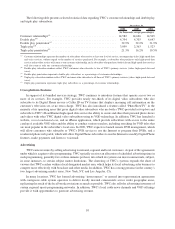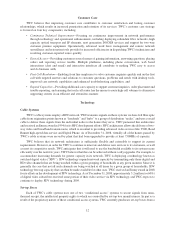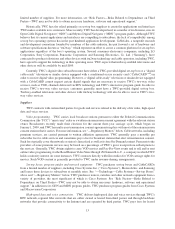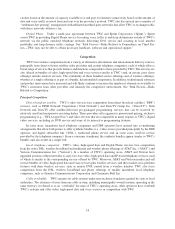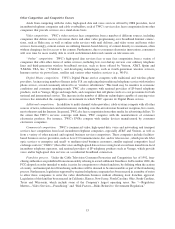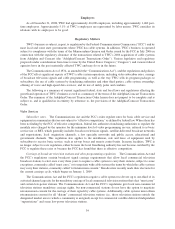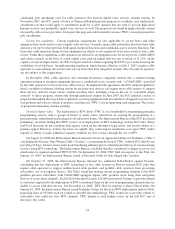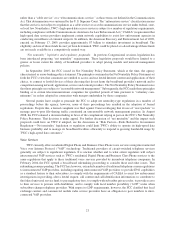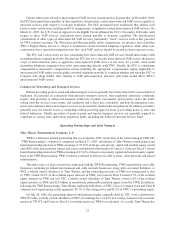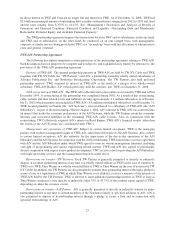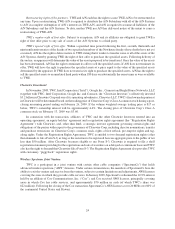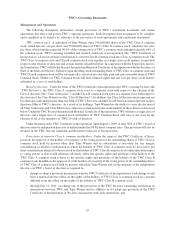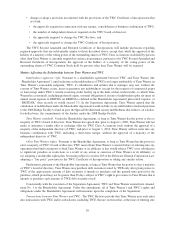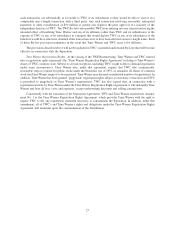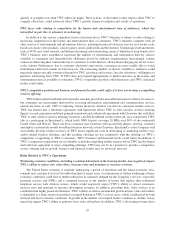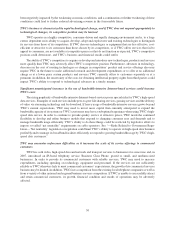Time Warner Cable 2008 Annual Report Download - page 30
Download and view the complete annual report
Please find page 30 of the 2008 Time Warner Cable annual report below. You can navigate through the pages in the report by either clicking on the pages listed below, or by using the keyword search tool below to find specific information within the annual report.has petitioned for review by the full FCC. In addition, Herring Broadcasting, Inc., which does business as
WealthTV, filed a program carriage complaint against TWC and other cable operators alleging discrimination
against WealthTV’s programming in favor of a similarly situated video programming vendors in violation of the
FCC’s rules. These proceedings remain pending.
Other federal regulatory requirements. The Communications Act also includes provisions regulating
customer service, subscriber privacy, marketing practices, equal employment opportunity, technical standards
and equipment compatibility, antenna structure notification, marking, lighting, emergency alert system require-
ments and the collection from cable operators of annual regulatory fees, which are calculated based on the number
of subscribers served and the types of FCC licenses held. The FCC also actively regulates other aspects of TWC’s
video services, including the mandatory blackout of syndicated, network and sports programming; customer service
standards; political advertising; indecent or obscene programming; Emergency Alert System requirements for
analog and digital services; closed captioning requirements for the hearing impaired; commercial restrictions on
children’s programming; equal employment opportunity; recordkeeping and public file access requirements; and
technical rules relating to operation of the cable network.
Franchising. Cable operators generally operate their systems under non-exclusive franchises. Franchises are
awarded, and cable operators are regulated, by state franchising authorities, local franchising authorities, or both.
Franchise agreements typically require payment of franchise fees and contain regulatory provisions address-
ing, among other things, upgrades, service quality, cable service to schools and other public institutions, insurance
and indemnity bonds. The terms and conditions of cable franchises vary from jurisdiction to jurisdiction. The
Communications Act provides protections against many unreasonable terms. In particular, the Communications
Act imposes a ceiling on franchise fees of five percent of revenues derived from cable service. TWC generally
passes the franchise fee on to its subscribers, listing it as a separate item on the bill.
Franchise agreements usually have a term of ten to 15 years from the date of grant, although some renewals
may be for shorter terms. Franchises usually are terminable only if the cable operator fails to comply with material
provisions. TWC has not had a franchise terminated due to breach. After a franchise agreement expires, a local
franchising authority may seek to impose new and more onerous requirements, including requirements to upgrade
facilities, to increase channel capacity and to provide various new services. Federal law, however, provides
significant substantive and procedural protections for cable operators seeking renewal of their franchises. In
addition, although TWC occasionally reaches the expiration date of a franchise agreement without having a written
renewal or extension, TWC generally has the right to continue to operate, either by agreement with the local
franchising authority or by law, while continuing to negotiate a renewal. In the past, substantially all of the material
franchises relating to TWC’s systems have been renewed by the relevant local franchising authority, though
sometimes only after significant time and effort.
In June 2008, the U.S. Court of Appeals for the Sixth Circuit upheld regulations adopted by the FCC in
December 2006 intended to limit the ability of local franchising authorities to delay or refuse the grant of
competitive franchises (by, for example, imposing deadlines on franchise negotiations). The FCC has applied most
of these rules to incumbent cable operators which, although immediately effective, in some cases may not alter
existing franchises prior to renewal.
At the state level, several states, including California, Kansas, New Jersey, North Carolina, Ohio, South
Carolina, Texas and Wisconsin have enacted statutes intended to streamline entry by additional video competitors,
some of which provide more favorable treatment to new entrants than to existing providers. Similar bills are pending
or may be enacted in additional states. Despite TWC’s efforts and the protections of federal law, it is possible that
some of TWC’s franchises may not be renewed, and TWC may be required to make significant additional
investments in its cable systems in response to requirements imposed in the course of the franchise renewal process.
See “—Competition—Other Competition and Competitive Factors—Franchise process.”
High-Speed Data Internet Access Services
TWC provides high-speed data services over its existing cable facilities. In 2002, the FCC released an order in
which it determined that cable-provided high-speed Internet access service is an interstate “information service”
20


